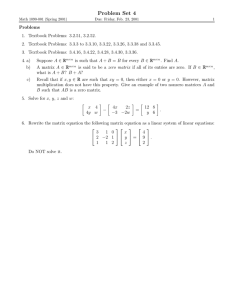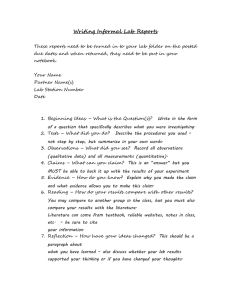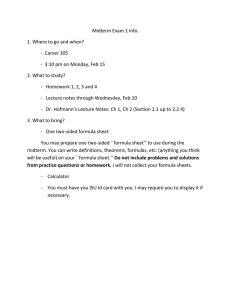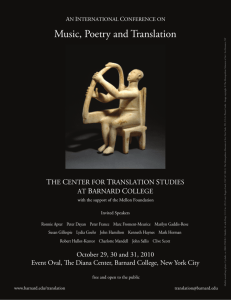BARNARD COLLEGE Introduction to Economic Reasoning Núria Quella-Isla
advertisement
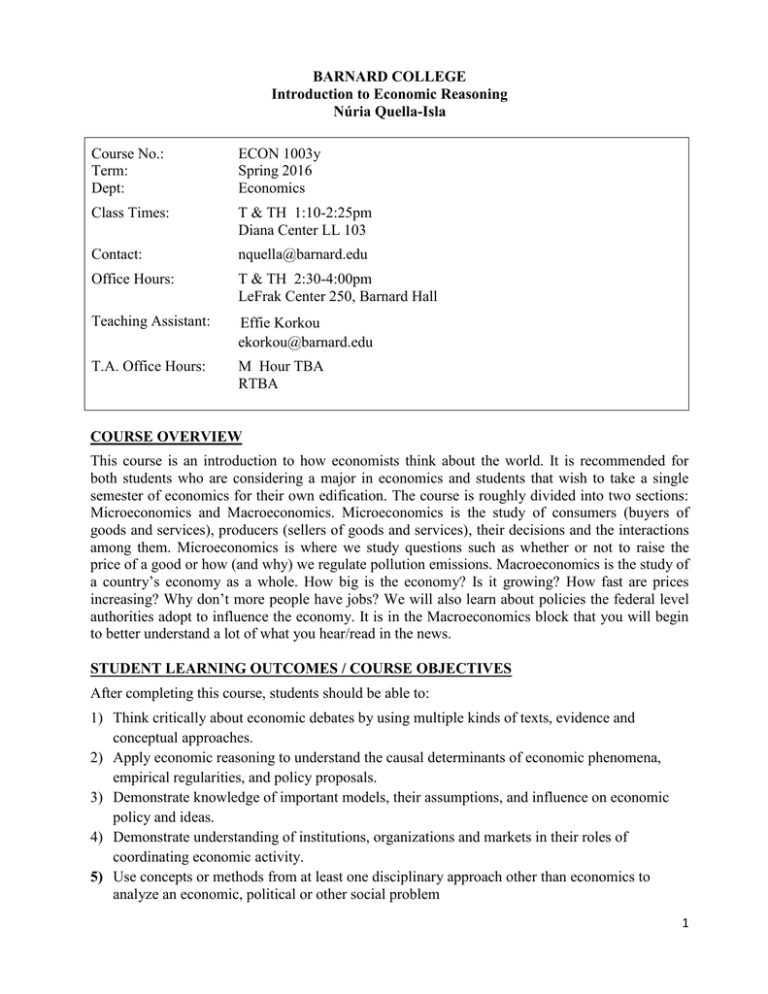
BARNARD COLLEGE Introduction to Economic Reasoning Núria Quella-Isla Course No.: Term: Dept: ECON 1003y Spring 2016 Economics Class Times: T & TH 1:10-2:25pm Diana Center LL 103 Contact: nquella@barnard.edu Office Hours: T & TH 2:30-4:00pm LeFrak Center 250, Barnard Hall Teaching Assistant: Effie Korkou ekorkou@barnard.edu T.A. Office Hours: M Hour TBA RTBA COURSE OVERVIEW This course is an introduction to how economists think about the world. It is recommended for both students who are considering a major in economics and students that wish to take a single semester of economics for their own edification. The course is roughly divided into two sections: Microeconomics and Macroeconomics. Microeconomics is the study of consumers (buyers of goods and services), producers (sellers of goods and services), their decisions and the interactions among them. Microeconomics is where we study questions such as whether or not to raise the price of a good or how (and why) we regulate pollution emissions. Macroeconomics is the study of a country’s economy as a whole. How big is the economy? Is it growing? How fast are prices increasing? Why don’t more people have jobs? We will also learn about policies the federal level authorities adopt to influence the economy. It is in the Macroeconomics block that you will begin to better understand a lot of what you hear/read in the news. STUDENT LEARNING OUTCOMES / COURSE OBJECTIVES After completing this course, students should be able to: 1) Think critically about economic debates by using multiple kinds of texts, evidence and conceptual approaches. 2) Apply economic reasoning to understand the causal determinants of economic phenomena, empirical regularities, and policy proposals. 3) Demonstrate knowledge of important models, their assumptions, and influence on economic policy and ideas. 4) Demonstrate understanding of institutions, organizations and markets in their roles of coordinating economic activity. 5) Use concepts or methods from at least one disciplinary approach other than economics to analyze an economic, political or other social problem 1 COURSE PREREQUISITES Students cannot get credit for ECON BC1003 if they have taken the Columbia introductory course ECON W1105. COURSE MATERIALS ***** Please note this is an electronic free classroom. Hence, no cell phones, no smart phones, tablets, computers, etc. unless you have spoken with me personally. ***** Our reference textbook will be: Essentials of Economics, by Paul Krugman, Robin Wells, and Kathryn Graddy, Worth Publishers, 2014. ISBN-13: 9781429278508. Check the following URL for information on the textbook and available student resources: http://www.macmillanhighered.com/Catalog/product/essentialsofeconomics-thirdedition-krugman Note that we will not have time to cover absolutely everything in the textbook in class. You are, however, responsible for reading every chapter completely. The textbook will be available at the bookstore and several volumes will be placed on reserve at the library. Class slides for every lecture will be posted in Courseworks at the beginning of the semester. Assignments, additional readings and any other ancillary materials will also be available in Courseworks prior to every class. Make sure you are up to date with materials and announcements. GRADING POLICY Your performance in this course will be best if you read the corresponding lecture materials before or immediately after the lecture. Take your own notes during class to complement class slides. Above all, do not fall behind. Material builds on itself and it will become increasingly difficult to keep up if you are not current. Your course grade will be composed as a weighted average of the following: Two midterm exams (non-cumulative) = 25% each; Final exam (non-cumulative) = 25%; Six homework sets = 25% in total. Grades will only be curved at the end of the semester, for the total course grade. Your lowest homework grade will be dropped. Missing homework will be graded as zero and will count toward your grade. Exams are scheduled during class time and the designated final exam slot. A strict policy of no make-up exams will be enforced. If you miss a midterm, you will take it together with the final. See the “Course Outline” section below and check http://registrar.columbia.edu/content/finalexam-schedules and http://barnard.edu/registrar/academic-calendar for all projected exam dates and holidays. Plan accordingly. Your TA, Effie Korkou, will hold weekly office hours. Effie will be responsible for all matters related to your assignments. Please email her, not me, with any and all issues regarding assignments (how or where to hand them in, grading, etc.). HONOR CODE Barnard College expects students to maintain standards of personal integrity that are in harmony with the educational goals of the institution. All exams and assignments in this class are to be 2 completed in accordance with the Barnard Honor Code. Columbia students commit themselves to this Honor Code upon registering for a Barnard course. The code says, in part: “We consider it dishonest to ask for, give, or receive help in examinations or quizzes, to use any papers or books not authorized by the instructor in examinations, or to present oral work or written work that is not entirely our own, unless otherwise approved by the instructor. We consider it dishonest to remove without authorization, alter, or deface library and other academic materials.” CLASS POLICY Please read the whole syllabus and familiarize yourself with its content. You are the only person that can make sure you are informed and up to date. If you miss a lecture, you are responsible for the material covered in your absence as well as for handing in assignments by their due date. You are responsible for having a working e-mail inbox AND for checking it regularly (at least once per lecture) for messages and/or class announcements. Likewise, check the Courseworks page and its content regularly. Come to every class on time, stay for the entire class unless you have to leave. In that case, please let me know in advance and sit near the door so the disturbance you will generate when you exit is minimal. During class, please turn your cell phone off or put it away. I do not chat, text or check my messages during class. I expect you are able to do the same. When you come for office hours, please send an e-mail in advance making an appointment and summarize in a couple of sentences the subject of your consultation, question, etc. This helps us efficiently manage attendance to office hours and make sure we can dedicate enough time to all. If you have another class during Effie’s or my office hours, please send us an e-mail to make an appointment for some other, mutually convenient time. ACCOMODATIONS Disabled students who need test or classroom accommodations must be registered in advance with the Office of Disability Services (ODS) in 105 Hewitt. 3 COURSE OUTLINE This course schedule is tentative and may be subject to changes according to class dynamics. Week Date Jan. 19 1 Jan. 21 Textbook Chapter/Content Deadline Course overview 1. First Principles 2. Economic Models: Trade-offs and Trade Jan. 26 2. Economic Models: Trade-offs and Trade Jan. 28 3. Supply and Demand I Feb. 2 3. Supply and Demand II Feb. 4 4. Price Controls and Quotas I Homework 1 due Feb. 9 4. Price Controls and Quotas II Homework 2 posted Feb. 11 5. Elasticity (we will not do Taxation) I Feb. 16 5. Elasticity (we will not do Taxation) II 2 Homework 1 posted 3 4 Homework 2 due 5 Feb. 18 Review Feb. 23 Midterm 1 6 Feb. 25 6. Behind the Supply Curve: Inputs and Costs I March 1 6. Behind the Supply Curve: Inputs and Costs II March 3 6. Behind the Supply Curve: Inputs and Costs III March 8 7. Perfect Competition & Supply Curve I March 10 7. Perfect Competition & Supply Curve II Homework 3 posted 7 Homework 3 due 8 March 15 Spring Break March 17 Spring Break 9 March 22 10 March 24 March 29 8. Monopoly (briefly also Oligopoly, and Monopolistic Competition) I 8. Monopoly (briefly also Oligopoly, and Monopolistic Competition) II 9. Externalities and Public Goods Homework 4 posted Homework 4 due 11 March 31 Review 4 Week Date April 5 Textbook Chapter/Content Deadline Midterm 2 12 April 7 April 12 10. Macroeconomics: The Big Picture Homework 5 posted 11. GDP and the CPI: Tracking the Macroeconomy I 13 April 14 April 19 14 11. GDP and the CPI: Tracking the Macroeconomy II 11. GDP and the CPI: Tracking the Macroeconomy III April 21 12. Unemployment and Inflation April 26 13. Economic Growth Homework 5 due Homework 6 posted Homework 6 due 15 April 28 Review May 6 to 12 - Final Examination Week Final Exam tentatively projected for Tuesday May 10th, 1:10-4:00pm 5

